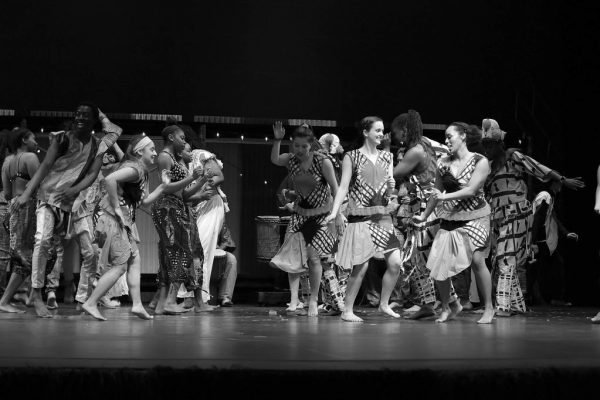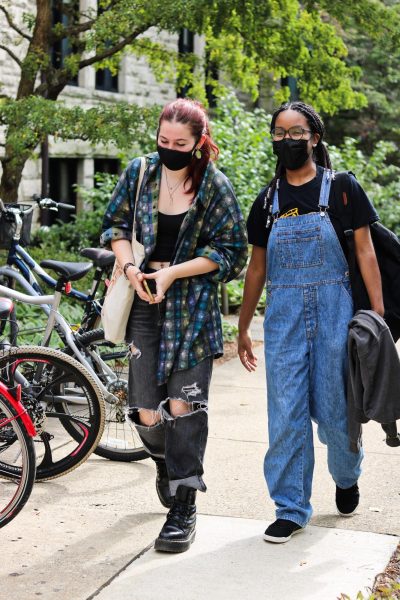College Students Lack Formal Music Opportunities
Since the Conservatory’s integration into the College in the mid-1800s, music has been an integral part of Oberlin. Students come from all over the world to engage in a liberal arts education and dabble in musical studies, while others come to hone their craft in the Conservatory. Sometimes, those students are one and the same. Approximately 2,300 students attend the College, 400 attend the Conservatory, 200 attend both. The College has historically been a place where students can focus on their liberal arts education while still heavily interacting with the music world.
The crossover between the College and Conservatory is one of the main reasons I attended Oberlin. I’ve been a singer for as long as I can remember — singing in school, in choirs in my area, and in private lessons. I’ve even taken lessons in India during one of my stays in Mumbai. Though I wanted to focus on a liberal arts major and decided not to apply to the Conservatory, I knew I wanted to continue music in college. That’s why I joined two a cappella groups, ’Round Midnight and Pitch Please, and am hoping to audition for other choral groups in the future, as well as taking secondary voice lessons next semester.
Oberlin College students are in a unique position to access music classes, concerts, and more opportunities designed to connect us to music through the Conservatory. Students in schools without conservatories don’t have the same benefits as we do. Their music course offerings are typically fewer and less varied than Oberlin’s courses, and their music groups are typically student-run. Most can only access informal music experiences. Oberlin College students, on the other hand, can access private lessons, large, well-structured groups, and countless music events.
However, non-Conservatory-led music groups such as the main a cappella groups and College student bands are sometimes not held in high regard. Our performances are held in informal spaces, our audiences are often distracted or disrespectful, and our concerts are infrequent.
Meanwhile, Conservatory music performances are held in high regard. Students, faculty, and guest artists contribute to more than 500 musical performances and events each year at Oberlin, and most student performances are from Conservatory students. Their events are high-quality — with ticketing, proper concert etiquette, and publicity done by the College itself.
I can acknowledge that this makes sense. Conservatory students are here to obtain pre-professional training for a career in the performing arts, and College musicians have opted to pursue a liberal arts education rather than a music-intensive one. Still, it sucks at times to have College musicians work hard to put on productions only for them to be under-attended and treated as second-tier. The music we work on is difficult, and we put many hours into making sure that our pieces sound good. And though a cappella and other student-run groups should be carefree, unrestrictive, and fun spaces to make music, our work should be appreciated.
Additionally, though the College works hard to ensure there are musical opportunities for College students, there are many faults in the system. College first-year Luke Dodson expressed his dissatisfaction with his musical experience at Oberlin thus far. He is a cellist, though not in the Conservatory.
“The biggest opportunity for string musicians at this school was the Arts and Sciences Orchestra, which is no longer happening this semester or possibly ever,” Dodson said.
The Arts and Sciences Orchestra is not happening in the 2022–23 academic year, according to the Oberlin website, though it is unclear whether the orchestra will continue the next year. Dodson moved on to express discomfort with the fact that the College is vague about what opportunities exist for College musicians.
As a vocalist, my experience with music has been generally positive. Instructions for auditioning for music groups, when and where performances were occurring, and how to take private lessons have all been made quite clear. However, being an instrumentalist is far tougher. Instrumentalists have to track down music opportunities, email professors several times, coordinate meetings with advisors, and search hard for any way to participate in music-making.
This should not be the case. The College and Conservatory should be more transparent about what musical opportunities exist for College students. Many College students are musicians, and for most of us, Oberlin’s musical history was a major factor that drew us to the school. There should be more of an effort on the College’s part to include College students in music-making.
Still, I am very grateful for the opportunities that Oberlin has granted me. By the end of the semester, I will have performed in four concerts and gone to see many more. I love and appreciate the music-oriented community this school has fostered, yet I would like to be more fully integrated into it. Until that happens, I guess I’m fine with remaining musically adjacent.




